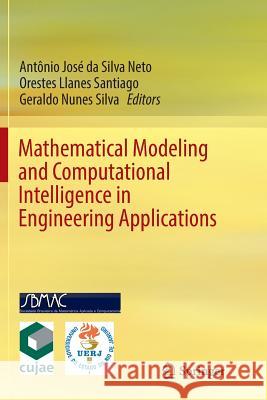Mathematical Modeling and Computational Intelligence in Engineering Applications » książka



Mathematical Modeling and Computational Intelligence in Engineering Applications
ISBN-13: 9783319817668 / Angielski / Miękka / 2018 / 179 str.
Mathematical Modeling and Computational Intelligence in Engineering Applications
ISBN-13: 9783319817668 / Angielski / Miękka / 2018 / 179 str.
(netto: 191,66 VAT: 5%)
Najniższa cena z 30 dni: 192,74
ok. 16-18 dni roboczych.
Darmowa dostawa!
Preliminary Correlations for Characterizing the Morphology of Abdominal Aortic Aneurysms as Predictor of Rupture.- Mathematical-Computational Simulations of Cytoskeletal Dynamics.- Fault Diagnosis with Missing Data based on Hopfield Neural Networks.- Diagnosing Time-Dependent Incipient Faults.- An Indirect Kernel Optimization Approach to Fault Detection with KPCA.- Uncertainty Quantification in Chromatography Process Identification based on Markov Chain Monte Caro.- Inverse Analysis of a New Anomalous Diffusion Model Employing Maximum Likelihood and Bayesian Estimation.- Accelerated Direct Problem Solution: A Complementary Method for Computational Time Reduction.- Effects of Antennas on Structural Behavior of Telecommunication Towers.- Comparing Two-Level Preconditioners for Solving Petroleum Reservoir Simulation Problems.- Assessment of the Reliability of Electrical Power Systems.- Polymeric Thin Film Transistors Modeling in the Presence of non-Ohmic Contacts.
This book brings together a rich selection of studies in mathematical modeling and computational intelligence, with application in several fields of engineering, like automation, biomedical, chemical, civil, electrical, electronic, geophysical and mechanical engineering, on a multidisciplinary approach. Authors from five countries and 16 different research centers contribute with their expertise in both the fundamentals and real problems applications based upon their strong background on modeling and computational intelligence. The reader will find a wide variety of applications, mathematical and computational tools and original results, all presented with rigorous mathematical procedures.
This work is intended for use in graduate courses of engineering, applied mathematics and applied computation where tools as mathematical and computational modeling, numerical methods and computational intelligence are applied to the solution of real problems.
1997-2026 DolnySlask.com Agencja Internetowa
KrainaKsiazek.PL - Księgarnia Internetowa









